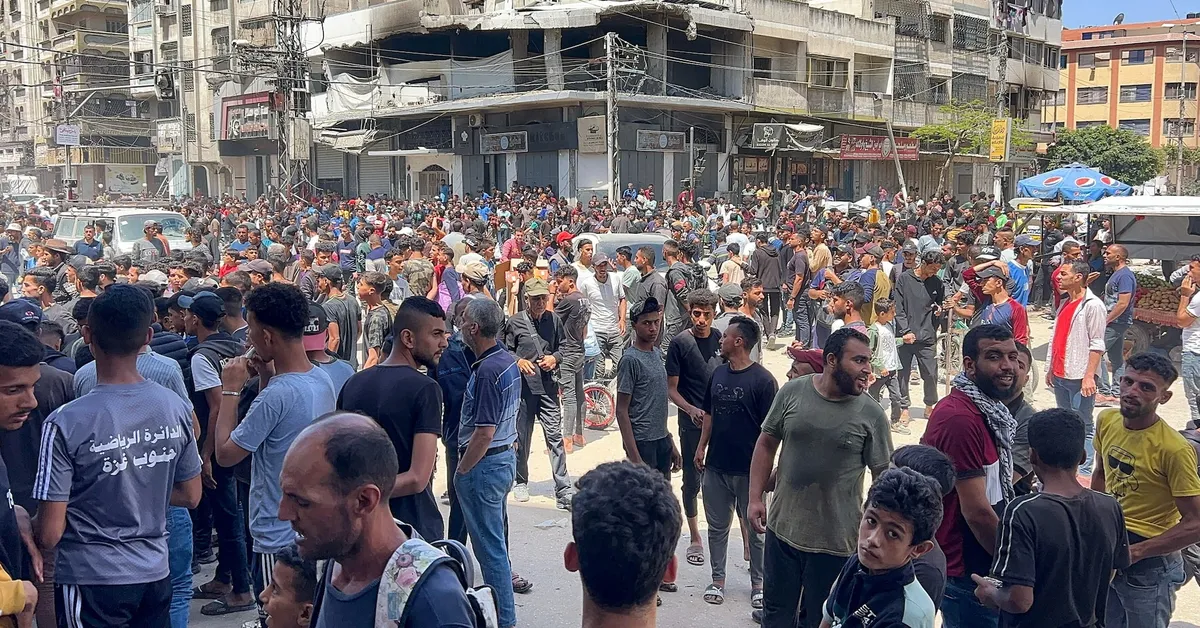
CAIRO/JERUSALEM/UNITED NATIONS, June 4 (Reuters) - The U.S.-backed Gaza Humanitarian Foundation (GHF) has announced that it will not distribute any aid on Wednesday. This decision comes as the organization pressures Israel to enhance civilian safety measures beyond the perimeters of its aid distribution sites. The call for increased safety follows a tragic incident in which dozens of Palestinians seeking assistance were killed.
The GHF has formally requested the Israeli military to implement measures that would guide foot traffic in a manner that reduces confusion and minimizes risks of escalation near military zones. They are advocating for clearer guidance for civilians and improved training to ensure civilian safety during aid distributions. "Our top priority remains ensuring the safety and dignity of civilians receiving aid," stated a GHF spokesperson.
In a concerning communication, an Israeli military spokesperson cautioned civilians against moving towards GHF distribution sites on Wednesday, labeling these areas as combat zones. On Tuesday, the Israeli military opened fire on a group it perceived as a threat near a GHF food aid distribution site, resulting in tragic consequences. The International Committee of the Red Cross reported that at least 27 individuals were killed and many others injured during the incident, which the GHF asserts occurred well beyond its designated site.
Witnesses among the Palestinians who sought food aid from GHF boxes on Tuesday described chaotic scenes, where there was no oversight during the handover of supplies, and no identification checks were conducted as crowds scrambled for help. Amidst this turmoil, the U.N. Security Council is scheduled to vote on Wednesday regarding a demand for a ceasefire between Israel and Palestinian militants Hamas, as well as for humanitarian access across Gaza. The region has seen a trickle of aid amidst ongoing chaos and bloodshed, especially following Israel's lifting of an 11-week blockade on the enclave, where famine conditions are increasingly dire.
U.N. spokesperson Stephane Dujarric emphasized the unacceptable risk civilians are facing, stating, "Civilians are risking – and in several instances losing – their lives just trying to get food." He criticized the aid distribution model supported by the U.S. and Israel, labeling it a "recipe for disaster," which has indeed been the case. This model is operated by the newly established GHF, which began its operations in Gaza a week ago and claims to have distributed over seven million meals from three designated secure distribution sites.
GHF Interim Executive Director John Acree urged humanitarian organizations in Gaza to collaborate with them, saying, "Work with us and we will get your aid delivered to those who are depending on it." However, the U.N. and various aid groups have declined to work with the GHF, citing concerns over its neutrality and the militarization of aid distribution. The GHF employs private U.S. security and logistics firms to facilitate the delivery of aid.
This initiative represents the latest effort to increase aid access to Gaza, where experts warn that the entire population of approximately 2.1 million people is at risk of famine. In the past, Jordan initiated humanitarian air drops, while the U.S. briefly set up a floating aid pier, both of which encountered significant challenges. The U.N. has consistently attributed the hindrances to aid delivery in Gaza to both Israeli actions and lawlessness within the enclave. Meanwhile, Israel accuses Hamas of misappropriating aid, a claim that Hamas has denied.
On Tuesday, it was reported that three Israeli soldiers lost their lives during combat in northern Gaza, while Gaza health officials stated that at least 18 additional Palestinians were killed in separate military strikes throughout the territory. However, Reuters has not independently verified these claims from northern and southern Gaza.
The ten elected members of the U.N. Security Council are urging the 15-member body to vote on a draft resolution that calls for an immediate, unconditional, and permanent ceasefire in Gaza, which must be respected by all parties involved. The draft resolution also demands the release of all hostages held by Hamas and others, as well as the immediate lifting of all restrictions on the entry of aid and its safe distribution throughout Gaza, including by the U.N.
According to Slovenia's U.N. Ambassador Samuel Zbogar, "The time to act has already passed. It is our historical responsibility not to remain silent." As the U.S. administration under President Donald Trump attempts to mediate a ceasefire in Gaza, it remains uncertain whether Washington will veto the draft resolution. A spokesperson for the U.S. mission to the U.N. indicated that they cannot disclose their actions currently under consideration. For a resolution to pass, it requires nine votes in favor and no vetoes from any of the five permanent members, which include the United States, Russia, China, Britain, or France.
The ongoing war in Gaza has persisted since 2023, following an attack by Hamas militants on October 7, which resulted in the deaths of 1,200 individuals in Israel and the kidnapping of approximately 250 hostages taken into the enclave, as per Israeli reports. In retaliation, Israel has conducted a military campaign that has claimed the lives of over 54,000 Palestinians, according to health authorities in Gaza, who do not differentiate between combatants and non-combatants.